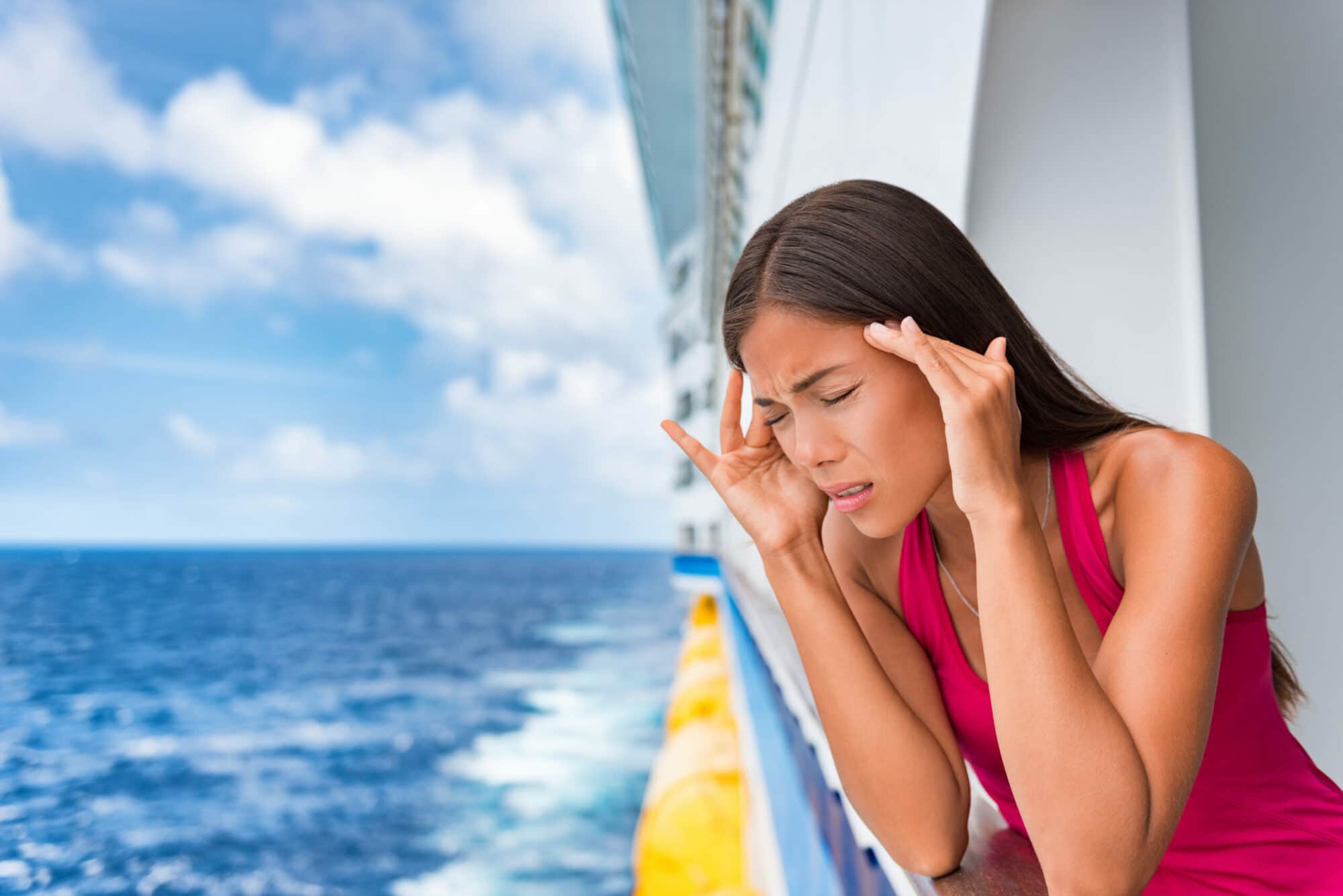Table Of Content

According to a representative for MSC Cruises, you don't need an appointment to go to the onboard medical centers. Here's what you need to know before you go, so you can feel confident that you'll have competent and comprehensive medical care if you fall ill while cruising on the high seas. People with ARI should be advised of the importance of covering coughs and sneezes and keeping hands clean because respiratory viruses may be shed after the isolation period ends.
Diagnosing Land Sickness
This bacterium causes an infection known as shigellosis, which can cause fever, stomach pain and diarrhea that can be bloody or prolonged. Your doctor also may prescribe medication, such as anti-anxiety drugs, for a short time. Drugs that treat motion sickness are not effective for treating mal de debarquement, she says. Ginger, either in the form of ginger ale or ginger supplements, is a natural remedy that may help ease motion sickness.
Seasickness Remedies: Drug-Free Options
While there is no guaranteed cure, there are several lifestyle changes and remedies that can help alleviate symptoms. If you experience severe land sickness after your cruise, it can be a debilitating condition that affects your daily life. You may feel dizzy, nauseous, and disoriented, making it difficult to perform even simple tasks. Fortunately, there are treatments available that can help you manage your symptoms and improve your quality of life. "People shouldn't be self-medicating," advises Glatt, chief of infectious diseases at Saint Vincent Catholic Medical Centers in New York . "See a physician in advance if you're going into a situation where you may have an increased risk of illness."
How to Prevent Seasickness on a Cruise
Since the line's itineraries include more time in port, ships are typically close to land. Azamara will also follow up with the guest to ensure they receive the necessary care. MSC Cruises' vessels are equipped with intensive care facilities where guests can be stabilized and cared for until the passenger can be transferred to a hospital. If the ship is at sea, the ship's captain and medical staff will need to decide how the passenger will be evacuated. Options may include a diversion of the ship to the nearest port, a boat transfer or, if necessary, a helicopter evacuation. Infection prevention and control (IPC) are critical to reducing the spread of ARI.
Guidance for Cruise Ships on Management of Acute Respiratory Illness (ARI) due to Viral Infection
Holland America also has established and well-practiced medical protocols surrounding treating seriously ill passengers. "In situations that require referral to shoreside hospitals, the shipboard treating doctors evaluate suitable options by medevac," a company spokesperson said. If you need to see someone during off hours, guest services can call an on-duty nurse. The last thing you want to think about before packing your bags and sailing away on your dream cruise vacation is what would happen if you got sick while on board the ship. In some circumstances, additional public health precautions, such as returning to port immediately or delaying the next voyage, may be considered to help ensure the health and safety of onboard travelers or newly arriving travelers. Cruise operators should ensure passengers and crew have access to well-stocked hygiene stations with soap and water and/or hand sanitizer, tissues, paper towels, and trash receptacles.

A travel insurance policy with good medical coverage can make up the difference or reimburse you for medical bills your regular insurance won't. Royal Caribbean Group's physicians and nurses are required to maintain Advanced Cardiac Life Support (ACLS) training. "In responding to medical emergencies, our goal is to first stabilize emergency patients and, when necessary, evacuate the patient to an appropriately equipped and staffed shoreside medical facility," its website says. "While Azamara's onboard staff is available to help with any medical issues that arise, the medical facilities are not intended as clinics for guests," a spokesperson says. "Azamara is not responsible for the diagnosis, treatment or services furnished by shipboard medical personnel, who are independent contractors."
Vessel captains may request assistance from CDC to evaluate or control ARI outbreaks as needed. After a lull during the COVID-19 pandemic, cases of the highly contagious virus that causes diarrhea and vomiting, aka stomach flu, spiked this winter and spring on land. As post-pandemic travel surges and millions of Americans return to cruise ships, an increasing number of cruise lines are reporting outbreaks at sea. If you’re prone to motion sickness, you may want to consider taking anti-nausea medication before your cruise.
Over 100 cruise passengers sickened after gastrointestinal illness outbreak - Fox Business
Over 100 cruise passengers sickened after gastrointestinal illness outbreak.
Posted: Wed, 31 Jan 2024 08:00:00 GMT [source]
Why Can Motion Sickness Persist, Even After Your Cruise?
Finally, acupuncture is an alternative therapy that can be effective in reducing symptoms of motion sickness. Acupuncture involves the insertion of thin needles into specific points on the body, and it is believed to help promote balance and alleviate nausea and vomiting. Over-the-counter medications like antihistamines or scopolamine patches can be used to prevent or alleviate sea sickness symptoms after a cruise. It is advisable to consult with a healthcare professional before taking any medication to ensure it is suitable for you.

If you are experiencing motion sickness after your cruise, there are several medications that can help alleviate your symptoms. Some of the most common medications for motion sickness include meclizine, scopolamine, and Dramamine. After a cruise, it’s common to feel like you’re still on the ship for a short period of time. This feeling is known as “sea legs” and is caused by your brain still adjusting to being back on land. These symptoms can be mild or severe and can last for minutes or hours, depending on the severity of the motion sickness.
Additionally, other symptoms may include dizziness, fatigue, migraines, depression, nausea and confusion. Unlike motion sickness, the symptoms of MdDS lessen with motion like walking or driving. Typically, the condition is more pronounced when the person is sitting or lying down. For most people, the nausea subsides within a few hours or a day after disembarking, but for MdDS sufferers, the symptoms last anywhere from six months to a full year. If you’re still experiencing motion sickness symptoms after your cruise, the Cleveland Clinic recommends seeing a healthcare provider. They can help determine if you’re experiencing mal de debarquement syndrome, a rare condition that causes a feeling of motion sickness even after you’re no longer in motion.
Consider what happened to Meredith Kulikowski, a government contractor from Laurel, Md. Mal de debarquement syndrome — “disembarkation sickness” — is one of the least understood travel disorders. It’s also a topic of intense curiosity, particularly as travelers begin planning next year’s cruises.
This can cause a conflict in the signals being sent to the brain, leading to motion sickness. One way that doctors diagnose motion sickness is by evaluating your internal models. These are the mental representations that your brain uses to predict how your body will move and react to different stimuli. When your internal models are disrupted, such as when you are on a moving ship, it can lead to symptoms of motion sickness. Studies have shown that women are more likely to experience motion sickness than men. This may be due to hormonal differences, as women’s levels of estrogen and progesterone fluctuate throughout their menstrual cycle.
Exercise increases blood flow and can help improve balance and coordination. However, it is important to avoid exercising immediately before or after a cruise, as this can exacerbate symptoms. Pregnant women may experience motion sickness due to hormonal changes, increased sensitivity to sensory stimuli, and changes in balance and coordination.
Ever since I started using Lysol to clean surfaces and vents when I travel I don't suffer like I used to. However, the same thing happened in January after a trip to Boston, so I'm thinking it's flying related and not cruise related. It happens most often after you’ve been out on the ocean, but riding in planes, trains, and cars can lead to it, too. It’s even been caused by water beds, elevators, walking on docks, and using virtual reality.

No comments:
Post a Comment